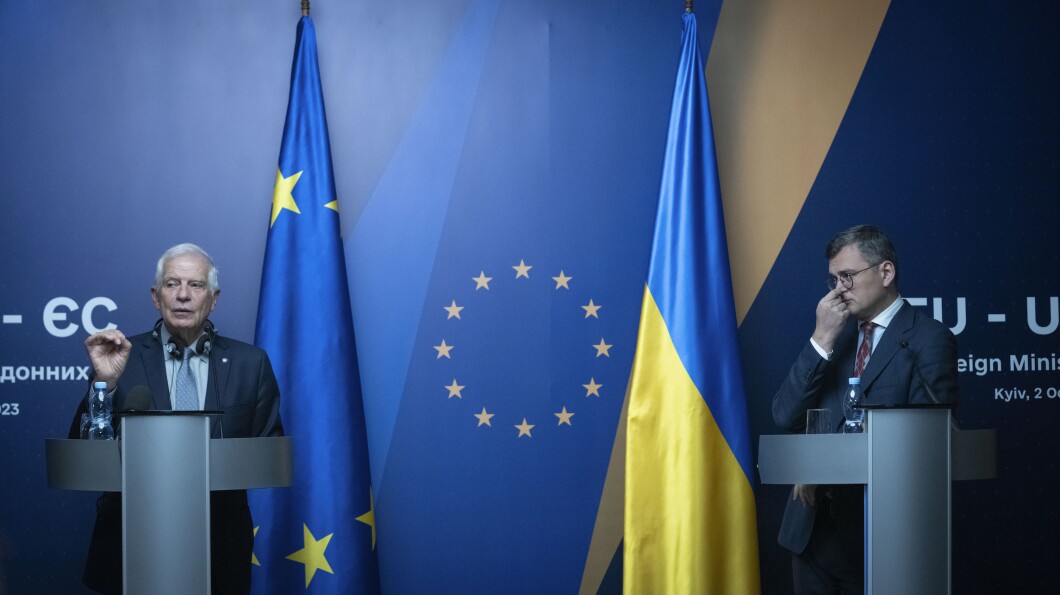
The fractiousness and delays holding up the congressional effort to fund the government and authorize additional military aid for the Ukrainian war effort are stoking anxiety among U.S. allies, just as European Union leaders attempt to signal their solidarity with Kyiv.
“We are worried,” a senior Baltic official told the Washington Examiner. “It doesn’t look nice, and it can encourage Moscow that they are on the right track, [that] they just need to survive until the elections or sometime.”
MCCARTHY IN TROUBLE AS GAETZ PROMISES VENGEANCE FOR SPEAKER’S PARTNERSHIP WITH DEMOCRATS
A clear majority of elected officials in the House and Senate favor continued support for Ukraine, but the unpopularity of that project among grassroots Republican voters, in combination with the fraught politics of the annual government spending bills, has bedeviled House Speaker Kevin McCarthy (R-CA). Faced with the fiscal year deadline, congressional leaders passed a stop-gap spending bill with no new aid for Ukraine, to the Kremlin’s apparent delight.
“Fatigue over this conflict, fatigue from the completely absurd sponsorship of the Kyiv regime, will grow in various countries, including the U.S.,” Dmitry Peskov, a spokesman for Russian President Vladimir Putin, told journalists. “Fatigue will lead to the fragmentation of the political establishment.”

The tension within Congress about U.S. aid for Ukraine was on display last week throughout a complicated government funding process that continued into the weekend. One bill to provide $300 million worth of assistance was approved by a large bipartisan majority, but it still drew the opposition of 117 House Republicans, meaning that fewer than half of the 221 Republicans in the House majority backed the assistance. That dispute set an uncomfortable backdrop for a landmark meeting of European Union foreign ministers in Ukraine.
“By coming to Kyiv, the European Union’s Foreign Ministers sent a strong message of solidarity and support to Ukraine in the face of this unjust and illegitimate war,” European Union High Representative Josep Borrell, a former Spanish politician, told reporters Monday. “We have been talking about the security commitments that we want to provide to Ukraine, showing our determination to stand by Ukraine in the long term, to deter acts of aggression and resist the destabilization efforts by Russia.”
Borrell’s supportive rhetoric couldn’t wholly mute the unsupportive signal sent by the congressional Republicans who oppose sending additional military aid to Ukraine. European leaders have committed about “€156 billion commitments by all main European donors (EU and non-EU), compared to less than €70 billion by the U.S.,” according to the Germany-based Kiel Institute for World Economy, but the United States remains the decisive military provider for the Ukrainian military.
“The Ukrainians are concerned about events over the weekend, as they should be, and Europeans as well,” former Ambassador Bill Taylor, who led the U.S. Embassy in Kyiv on two occasions, told the Washington Examiner during an interview from the Ukrainian capital. “The Europeans are putting on a brave face … [but] they don’t have the capability to do what we’re doing.”
That dynamic has been demonstrated in recent months by the European Union’s struggle to fulfill a pledge to produce a million rounds of artillery shells by next year. “I don’t know where these rounds are coming from,” Nammo CEO Morten Brandtzaeg, who leads a major Norwegian defense company, told the New York Times. “The industry capacity is not there.”
That’s a problem with no quick solution absent U.S. support. “The Americans have to step up and continue the support on the military side, or else Ukraine is going to have a very, very tough time,” Taylor, a former Marine and veteran of the Vietnam War, said. “I think if we stop our military support, I think Putin could see a path to success on the battlefield in Ukraine.”
The existence of a bipartisan majority that supports the continuance of aid to Ukraine is not lost on Taylor or policymakers in Kyiv.
DESANTIS HITS BACK AT TRUMP DURING CALIFORNIA GOP CONVENTION
“I believe that there will be a happy ending to this story,” Ukrainian Foreign Affairs Committee Chairman Oleksandr Merezhko told the Washington Examiner. “I understand that Republicans are also diverse, it’s democracy after all, and there is a certain pluralism [of views] within Republicans, it’s normal, but I hope that, still, a majority of Republicans, they will follow the example of Reagan and his policy and will continue to support Ukraine. So, basically, I’m optimistic.”
And so is Putin, some officials believe. “Even if it’s fixable,” the senior Baltic official said, “this signal will be taken out and reported to Putin and amplified saying, ‘See, you have been always right, we have outwaited Western patience, and we are close to winning.’ Although [Russian victory is] not coming.”





